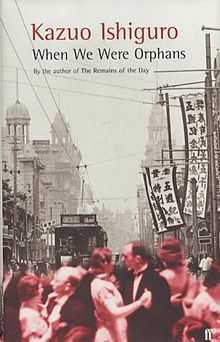When We Were Orphans
 First edition | |
| Author | Kazuo Ishiguro |
|---|---|
| Country | United Kingdom |
| Language | English |
| Genre | Crime novel |
| Publisher | Faber and Faber |
Publication date | 2000 |
| Media type | |
| Pages | 313 pp |
| ISBN | ISBN 0-571-20516-X |
| OCLC | 50915706 |
When We Were Orphans is the fifth novel by the British-Japanese author Kazuo Ishiguro, published in 2000 (ISBN 0-571-20516-X). It is loosely categorised as a detective novel. When We Were Orphans was shortlisted for the 2000 Man Booker Prize, though it is considered one of Ishiguro's weakest works, with Ishiguro himself saying "It's not my best book".[1]
Plot summary
The novel is about an English man named Christopher Banks. He used to live in the international settlement area of Shanghai, China in the early 1900s, but when his father, an opium businessman, and his mother disappear within an interval of a few weeks, Christopher is sent away to live with his aunt in Britain. Christopher vows to become a detective to solve the case of his parents' disappearance, and he achieves this goal through ruthless determination. His fame as a private investigator soon spreads, and in the late 1930s he returns to China to solve the most important case of his life. The impression is given that if he solves this case, a world catastrophe will be averted, but it is not apparent how. As Christopher pursues his investigation, the boundaries between fact and fantasy begin to evaporate.
At this time in China, Christopher is caught up in the battles between the Japanese and Chinese. Through an old detective, he locates the house at which his parents may have been held. However, this event was a few decades earlier but it seems that Christopher still believes adamantly that they are still there. On his way, he enters a war-torn police station belonging to the Chinese. After convincing them of his neutrality, he persuades the commander to direct him to the house of his kidnapped parents. After a while, however, the commander refuses to take Christopher further, so he goes alone. Throughout all this, he appears to disregard the commander's words that what he is doing is dangerous, and even appears to be rude to him. He meets an injured Japanese soldier who he believes is his childhood friend Akira. They enter the house only to find out that his parents are not there. Japanese soldiers enter and take them away.
He later learns from his uncle that his father in fact ran away to Hong Kong with his new lover, and that his mother a few weeks later insulted Chinese warlord Wang Ku, who then captured her to be his concubine. Uncle Philip (not his real uncle, but a former lodger at their residence in Shanghai) was complicit in the kidnapping, and made sure Christopher was not present when this kidnapping took place. He offers Christopher a gun to kill him, but Christopher refuses. He learns that his father later died of typhoid but that his mother may still be alive. Uncle Philip reveals to him the truth about the source of his living expenses and tuition fees during Christopher's early years in England. Christopher is told that he had been living off his mother, who only agreed to co-operate with Wang Ku after he had promised to lend financial support to her son.
Several years later, Christopher is reunited with his mother, but she does not recognise him. He uses his childhood nickname, "Puffin", and his mother seems to recognise it. He asks her to forgive him, but she is confused as to what he should need forgiveness for. Christopher takes this as confirmation that she has always loved him.
Reception
Philip Hensher wrote that "The single problem with the book is the prose, which, for the first time, is so lacking in local colour as to be entirely inappropriate to the task in hand." He concludes that "The resolution is moving and graceful, but the problem of the voice is a universal one, present and incredible in every sentence".[2]
Michiko Kakutani said that "Mr. Ishiguro simply ran the notion of a detective story through the word processing program of his earlier novels, then patched together the output into the ragged, if occasionally brilliant, story we hold in our hands."[3]
References
- ↑ Chloe Diski (4 March 2001). "Paperback of the week". The Guardian. Retrieved 29 June 2010.
- ↑ Philip Hensher (19 March 2000). "It's the way he tells it...". The Guardian. Retrieved 29 June 2010.
- ↑ Michiko Kakutani (19 September 2000). "Books of the Times; The Case He Can't Solve: A Detective's Delusions". The New York Times. Retrieved 29 June 2010.
External links
- Ishiguro takes a literary approach to the detective novel. Interview by Alden Mudge.
- Lynn I. Miller: Kazuo Ishiguro – When we were orphans.
- Brian H. Finney: Figuring the Real: Ishiguro's When we Were Orphans. 2001.
| ||||||||||||||||||